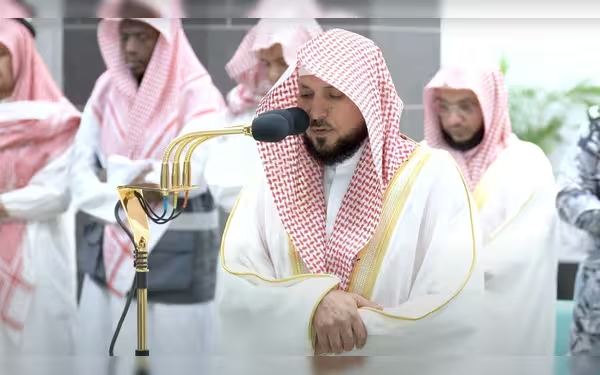Saturday, October 5, 2024 08:19 PM
Contrasting Speeches by Al-Muaiqly and Sharif
- Emphasis on self-reform and national progress in recent speeches
- Highlighting economic challenges and potential contributions in Saudi Arabia and Pakistan
- Disparity in Muslim world's unified calendar highlighted by speakers
 Image Credits: Middle East Eye
Image Credits: Middle East EyeRecent speeches by Al-Muaiqly and Sharif shed light on self-reform, economic challenges, and calendar disparities in the Muslim world, emphasizing the need for unity and collaboration for progress.
Two recent speeches have captured the attention of audiences worldwide, shedding light on contrasting themes that reflect the current state of affairs in the Muslim world. The first speech, delivered by Kaaba Imam Sheikh Maher Al-Muaiqly at the Hajj gathering in Arafat, emphasized the urgent need for Muslims to embark on a journey of self-reform to alleviate the suffering of Palestinians. In stark contrast, Prime Minister Shehbaz Sharif's address to the nation marked the first 100 days of his tenure, urging Pakistanis to focus on self-improvement and national progress.
Both speakers underscored the importance of personal and societal transformation. Al-Muaiqly highlighted the necessity of advancement within the Muslim community, while Sharif envisioned Pakistan as a potential economic powerhouse that could positively influence the broader Muslim world.
The speeches also delved into the economic landscapes of Saudi Arabia and Pakistan. Despite Saudi Arabia's abundant oil resources, the country faces challenges stemming from an underdeveloped workforce. On the other hand, Pakistan's population, if empowered and equipped with the right tools, has the potential to make significant contributions to the Muslim world through their skills and dedication.
One notable issue that emerged from these events was the lack of a unified calendar within the Muslim world, as evidenced by the timing discrepancies between the Hajj gathering at Mina and Edul Azha celebrations in different countries. This disparity, particularly in the digital age, serves as a poignant reminder of the divisions that Al-Muaiqly highlighted in his speech.
The contrasting themes in the recent speeches by Al-Muaiqly and Sharif offer valuable insights into the challenges and opportunities facing the Muslim world today. As individuals and societies strive for progress and unity, it is essential to heed the calls for self-improvement and collaboration put forth by these influential figures. By embracing change and working towards common goals, the Muslim community can pave the way for a brighter and more prosperous future for all.













